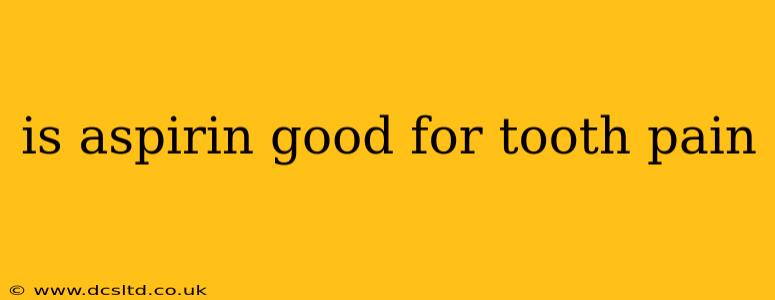Is Aspirin Good for Tooth Pain? A Comprehensive Guide
Tooth pain can be excruciating, leaving you searching for quick relief. Many reach for over-the-counter medications like aspirin, but is it the right choice for dental discomfort? The answer is nuanced, and understanding the complexities is crucial for effective pain management and oral health.
While aspirin is a readily available and effective pain reliever, its suitability for toothaches depends on the underlying cause and individual circumstances. It's not a cure for tooth pain, but it can help manage the symptoms. Let's explore this further.
What is Aspirin and How Does it Work?
Aspirin, or acetylsalicylic acid, is a nonsteroidal anti-inflammatory drug (NSAID). It works by reducing inflammation and inhibiting the production of prostaglandins, chemicals in the body that contribute to pain and fever. This makes it effective for various types of pain, including headaches, muscle aches, and, in some cases, toothaches.
Can Aspirin Relieve Toothache Pain?
Aspirin can provide temporary relief from mild to moderate toothache pain. If your pain is caused by inflammation, such as gingivitis (gum inflammation) or a minor injury, aspirin may help reduce the swelling and alleviate the discomfort. However, it's important to note that aspirin does not address the root cause of the toothache. Taking aspirin might mask the pain, potentially delaying seeking professional dental care when it's needed.
What Types of Tooth Pain Might Aspirin Help With?
Aspirin might offer temporary relief for:
- Gingivitis (gum inflammation): The anti-inflammatory properties of aspirin can help reduce swelling and pain in inflamed gums.
- Minor dental injuries: For example, if you've chipped a tooth or experienced a minor impact, aspirin might help manage the resulting pain and inflammation.
- Post-dental procedure pain: In some instances, aspirin might provide supplementary pain relief after minor dental procedures, though dentists usually prescribe other pain medications.
When Aspirin is NOT the Right Choice for Tooth Pain
Aspirin is not recommended for several types of tooth pain:
- Severe toothaches: Intense pain suggests a serious underlying problem, and aspirin is insufficient to address this. You should seek immediate dental care.
- Abscessed tooth: An abscess is a serious infection that requires immediate professional treatment with antibiotics and possibly surgery. Taking aspirin alone can mask the symptoms and delay critical care.
- Tooth sensitivity: Aspirin is unlikely to help with sensitivity to hot, cold, or sweet foods and drinks.
- Underlying medical conditions: Individuals with certain medical conditions, like bleeding disorders or stomach ulcers, should avoid aspirin without consulting their physician.
- Children and adolescents: Aspirin should not be given to children or adolescents due to the risk of Reye's syndrome, a rare but serious condition.
What are Better Alternatives for Tooth Pain?
For severe or persistent toothaches, always consult a dentist. They can diagnose the cause of your pain and recommend appropriate treatment. Your dentist may prescribe stronger pain relievers, such as prescription-strength NSAIDs or opioids, depending on the severity of your condition. For mild pain, over-the-counter alternatives like ibuprofen (Advil, Motrin) or acetaminophen (Tylenol) might be more suitable than aspirin for some individuals.
Should I Rinse My Mouth with Aspirin?
No, never rinse your mouth with aspirin. This can damage your gums and oral tissues, and it won't effectively address the underlying cause of your tooth pain.
Can I take Aspirin with other medications?
Always consult your doctor or dentist before taking aspirin with other medications, especially if you're on blood thinners or other pain relievers. Interactions can occur, potentially leading to adverse effects.
In conclusion, while aspirin can provide temporary relief from mild toothache pain in some specific circumstances, it's crucial to remember that it's not a substitute for professional dental care. For persistent or severe toothaches, always seek immediate dental attention to determine the underlying cause and receive appropriate treatment.
